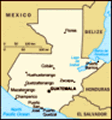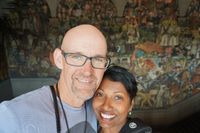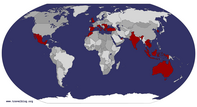Advertisement
Published: June 17th 2016
HE SAID... Today we were travelling the very short distance (7km) from Panajachel to
San Jorge la Laguna.
After checking out of Hotel Utz-Jay at midday, we lunched on the shoreline of Lago Atitlan. We then headed back to the hotel at 3pm, jumped into a minibus and climbed out of Panajachel to San Jorge la Laguna, the village of our host family for the night.
We arrived around 3:30pm, unloaded our packs and met Dora (our host) and her eight year old son Anthony on the steps of the church in the main town square. Dora’s family is from the ethic group of the Kaqchiquel in San Jorge, and she has been welcoming travellers into her home for the past four years. We climbed the narrow and steep cobblestone path to Dora’s small concrete brick house, where we met her two other sons Danilo and Christopher. The six of us sat in a tiny open walkway outside our room before moving to the roof area of the house. We’d picked up a game of tic-tac-toe from Panajachel, and we played it relentlessly with the three boys on the roof. Anthony started throwing a ball to me, and he
was clearly bursting to play any type of game, so Ren and I took him down to the main town square where we played basketball beside the church for about an hour in the heat of the afternoon sun, while nearly every other kid in the village was playing soccer on the uneven gravel surface of the town square.
On the way back to our home stay, we picked up a drink for Anthony and his two brothers, both of whom had been tasked with chores and therefore were unable to play with us. When we got back, Ren showed the boys a few games on her phone, and they were hooked. At 5pm we walked to the highest point of San Jorge, which provided an amazing panoramic view of Panajachel, Lake Atitlan and the three volcanoes – Atitlan, Toliman and San Pedro.
We walked back to the town square, watched the local kids play soccer before making our way back to our home stay. We met Danilo and Anthony on the way. When we arrived, we were invited next door to Dora’s mother’s place for tea and cake. We tried our hand at making tortillas, but we
were both hopeless. Dora and her mum made heaps of tortillas while we played tic-tac-toe with the boys.
We met two of Dora’s sisters – Ferdinanda and Sophia. Ferdinanda still lived with her mum, while Sophia had three boys, all of whom we met – Diego, Pablo and Nestor (Nestor was only three months old). Alex, Dora’s husband, arrived home from work at 7:30pm, and on his arrival we all sat down to a meal of fried beans, chicken, rice and tortillas. It was a great experience to sit down with a local village family and share a meal.
Alex spoke Kaqchiquel, Spanish and reasonably good English; his three sons spoke Kaqchiquel, Spanish and limited English; and everyone else in the room spoke Kaqchiquel, Spanish and next to no English. This made conversation very difficult! Alex told us how he’d been a good local soccer player until a serious car accident left him hospitalised for a month and house bound for another three months. He also told us how he’d once worked in Guatemala City for three years, but the inconsistent pay had forced him to return to San Jorge. I was surprised he’d never been to Santiago
Atitlan, given it was only a 45 minute ferry trip across the lake. By Alex’s own admission, the family was struggling financially, but there was a warmth and happiness around the dining table, and it was a privilege to share a meal with them.
We played tic-tac-toe into the night, and we also played draughts (which Ren had on her phone) with the boys. The relationship between the three boys and their parents was incredible, as was the custom of each person having to inform the whole table – person by person – that they had finished their meal by thanking them. This terrified me when it came to my turn, but I managed to stumble through everyone’s name, thank them for the meal (in Kaqchiquel) and inform them that I did not require any more food.
As the night wore on, Alex suggested we go to bed around 9:30pm, as this was the time everyone else normally retired. He worked as a bus inspector in Panajachel from 6am to 7:30pm every day except Sunday, so I understood entirely why he needed an early night. We thanked everyone again for their incredible hospitality, walked back to Alex and
Dora’s house and retired to Alex and Dora’s bedroom – they were sleeping the night with their sons.
Their house was basic. It was made with concrete bricks, and it was unfinished (as were most of the houses in the village). The laundry had a dirt floor and was home to the family’s chickens. There was no kitchen, which made us assume that all meals were prepared next door at Dora’s mother’s place.
We were exhausted from the day, so we were happy to retire at 10pm. The night was a little bumpy, as a dog outside our bedroom barked at everything that moved, which meant we woke every fifteen minutes or so. It wasn’t the family dog, as Danilo had told us they used to have a dog until it was recently run over, which he conveyed to us in sign language, not words. It was hard to watch.
We woke early at 5am, tip toed around the house so as not wake anyone, wandered outside taking photos until Dora (who was next door at her mother’s house) noticed us. We realised breakfast was next door – this had probably been conveyed to us the night
before, but we hadn’t understood. We walked over and sat down to a basic breakfast of scrambled eggs, beans, tortillas and tea.
Alex had already gone to work, so we had breakfast with Dora, her mum and two of her boys (Anthony and Danilo). At the end of the meal we thanked her for the meal and said our goodbyes, then made our way back to the town square where our minibus was waiting. We loaded our packs, jumped in and started out on the final leg of this part of our journey – we were heading to Antigua where we started 24 days ago.
SHE SAID... We left Panajachel and drove 10 minutes around Lake Atitlan to the little village of
San Jorge la laguna where we stopped in front of the church and waited for Daniel, the coordinator of the village homestays. We met our allocated host Dora and eight year old Anthony who walked us up a very steep hill to their house. Our group had been split into four groups of two. Dora showed us to a double room, which I suspected was her room. There were two bedrooms downstairs, with a
family bathroom and outdoor sink area for laundry, and two more rooms upstairs on a small rooftop.
We sat on the roof where it was cooler and met Dora’s other two sons – twelve year old Christopher and ten year old Danilo. They were very lovely kids and tried hard to communicate with us in English which they were learning at school, along with Spanish. Their home language was Kaqchiquel, which I’d heard was a little challenging to pick up (like other Mayan languages), with many interesting guttural and swishing noises. However, Fabian had given us a cheat sheet with Kaqchiquel words that we may need, and our local guide Umberto from the day before had taught us the two words key words –
utz awach? (hello/how are you?) and
matiox (thank you).
We’d taken a game of tic-tac-toe which we played on the rooftop with the boys. Andrew was up for a game of football with little Anthony, the sporty one of the family. We walked back down to the church which had a big dusty playing field in front of it, as well as a basketball court. After playing for an hour or so in the
hot afternoon sun, we walked back up the hill to our homestay. While I was running around playing with Anthony, I noticed there wasn’t even one girl or woman playing sport, whereas half the male population was out being active. After I realised that, I felt a bit self-conscious, but I wasn’t too worried about it.
We walked back down to the church and met the group at 5pm for a walk up to the sunset viewing point over Lake Atitlan. San Jorge sits between Panajachel and Solola, right on the lakefront. The path was steep, and it went through people’s properties which made some territorial dogs not very happy with us. However, when we reached the top the view was spectacular… a beautiful view of the village, the lake and the volcanoes in the distance. We could see Pana spread out down below us, and we could even make out the public jetty we’d been standing on that morning. The dusky pinks over the three volcanoes were lovely, but I have to admit I preferred looking at the volcanoes from ground level rather than standing high on a hill.
We walked back to the church and mingled
with the local kids as we watched a football game, and Fabian thrilled the little kids with his newly purchased drone. We wandered back up to our homestay and were met by Anthony and Danilo in the street – they probably wondered if we’d remember how to find our way back to their house through the meandering lanes on the hill.
Soon after we got back, we were invited to have coffee in the next house which turned out to be Dora’s mum’s house. We were served tea and coffee to drink with sweet bread and the almond cake we’d taken as a gift. Now the rambling rooms in our part of the house made sense – it was an annex to the main house which had a large lounge, two bedrooms and a kitchen. Communication was reduced to 100% sign language and smiles with Dora’s mum Christina and her sister Ferdinanda. I could communicate a little with Dora in Spanish, but the older members of the family predominantly communicated in Kaqchiquel. It is a humbling experience when you find yourself completely unable to communicate. It makes life as you know it seem briefly foreign, even to you. In
a good way.
The men were considered the primary bread winners in the village and usually had to travel for work, but I was fascinated by the enterprising women of the village. In addition to having babies and managing the household, they also ran little stores out of their houses, made jewellery and did embroidery to sell at the markets.
While we waited for Dora’s husband Alex to come home from Pana, the games on my old iphone proved to be a winner as an ice breaker, and the kids took to playing tic-tac-toe and draughts (checkers) on it very quickly. They even showed their Aunt Ferdinanda how to play and she commandeered it for a while. Christopher was a very smart child, which was evident in how he communicated with us and absorbed what was going on around him. However, as the oldest child he had the largest burden of the household chores, which he clearly didn’t like doing. A sullen pre-teen is the same anywhere in the world. 😊
Dora and her Mum tried to teach us to make tortillas, but I was taken aback by how hard it was to manipulate the wet corn
masa dough into anything with my hands, much less a thin perfectly formed circle. We tried a few times but had to give up, as we were wasting the dough. Watching Christina and Dora make the tortillas, I realised that they worked really fast and they slapped the wet dough between their palms with constant but specific pressure. I think I’d have to waste a lot of masa before I could get close to creating anything resembling a tortilla.
By dinner time, most of the extended family (who didn’t live with Dora’s Mum) had also turned up for dinner. I’m not sure if this was a regular Friday night occurrence or if they’d just come to check out the foreigners. Dora’s younger sister turned up with three month old baby Nestor, six year old son Pablo and pre-teen son Diego. We sat down to dinner as soon as Alex came home. Conversation was made easier by the fact that Alex spoke a little English. We could tell that he was quite tired, but he tried hard to communicate with us. He worked six days a week as a bus inspector, leaving home at 6am and getting back at 7:30pm.
Alex had no qualms about asking our ages, and volunteered that he was 33 and Dora was 35. He was genuinely curious about our lives, but the language barrier was frustrating. We asked him about all the soccer trophies in the house, and apparently he was a star player until he was in a bus accident and couldn’t walk for four months. He seemed sad that he couldn’t play football anymore, but I did wonder where he’d find the time for recreational activities, even if he could.
I couldn’t help but reflect on the fact that beneath the surface, families the world over have the same pressures, same joys and same routines; just in a different context and within different frameworks. At the risk of sounding cheesy, I think we are more similar than we are different, but borders, politics and religions have a bad habit of trying to make us feel disparate.
Dinner consisted of fried chicken, beans, rice and tortillas. It was a simple but tasty meal. After dinner I helped Dora with the dishes and I’d hoped we could call it a night after that, but everyone was happy to stay up chatting. Alex
had an early start the next day, and that was the only thing that saved us. I was seriously exhausted by then.
I didn’t sleep very well, as the house was right on the footpath that led to the top of the hill, and there were a few late night loud talkers who competed with the dogs and roosters to see who could wake us up the most often. However, the hot shower in the morning made me feel better. We packed our bags and waited for the rest of the house to stir. Alex had gone to work, and we hadn’t realised that Dora had assumed we’d come over to her Mum’s house when we wanted breakfast. So it turned out to be a rushed breakfast consisting of a cup of tea with scrambled eggs, beans and tortillas. We thanked Dora and her family for their hospitality, said our goodbyes and then rushed down the steep hill to the church for our 8:30am pick up.
The homestay had been a very sincere and authentic experience, of which I was very appreciative. I always find homestay experiences extremely awkward due to our inability to communicate effectively, but they
are always an interesting experience and also one of the best ways to learn about a culture from the inside. The families not only get paid for hosting people, but also get to meet people they would never interact with otherwise (as do we). I have come to appreciate homestays, because they are a good way to give back to (usually very poor) local communities.
Next we travel east to Antigua, Guatemala.
Advertisement
Tot: 0.063s; Tpl: 0.016s; cc: 12; qc: 27; dbt: 0.0193s; 1; m:domysql w:travelblog (10.17.0.13); sld: 1;
; mem: 1.2mb














































Siewch
Siewch
Only Just Caught Up With Your Blogs...
Phew. I've had a rough couple of months at work, I bought a house and moved into it, and I sold our old house... I've only just managed to catch up with your blog. Looks like you have had an epic trip so far! I never thought of traveling through Central America but I'm now tempted thank to you!